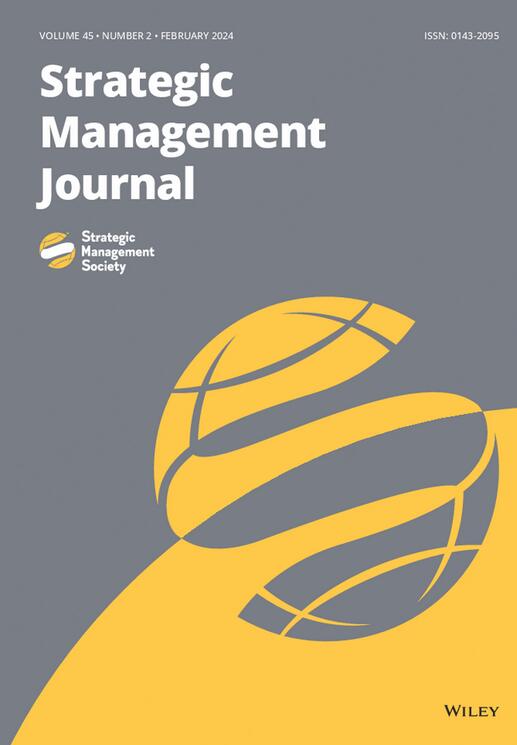STEM 创业中的性别差距:平价医疗法案》改革的影响
IF 7.2
1区 管理学
Q1 BUSINESS
引用次数: 0
摘要
研究摘要本文探讨了《可负担医疗法案》(ACA)医疗保险改革是否缩小了科学、技术、工程和数学(STEM)创业方面的性别差距。我认为,《可负担医疗法案》减轻了雇主提供的医疗保险对流动性的限制,鼓励了具有重要偶然性的创业:由于在降低成本的供应方和医疗保险需求方的性别差异,其影响仅限于女性;由于驾驭保险市场所需的人力和金融资本,其影响仅限于从事 STEM(相对于非 STEM)创业的女性。通过 ACA 准实验,我发现了 STEM 创业中性别差距缩小的一致证据。出乎意料的是,已婚妇女创办非法人企业所带来的 STEM 创业效应有所增强。定性访谈见解和实证研究结果为这些模式提供了解释。 本研究探讨了科学、技术、工程和数学(STEM)领域的创业性别差距是否可以通过制度因素来减少雇主提供的工作福利对劳动力市场流动性的限制。通过美国 ACA 改革的视角,我发现在替代性个人保险市场中,更多女性(相对于男性)获得更实惠的健康保险的机会极大地鼓励了 STEM(相对于非 STEM)创业,从而缩小了 STEM 创业的性别差距。与通常的假设相反,这种效应是由已婚(与未婚)女性和非公司(与公司)自营职业所驱动的。这些发现有助于分辨哪些群体能从促进 STEM 创业多元化的政策努力中受益,并意味着雇主提供的工作福利作为留住人才的工具的有效性取决于工人的各种特征。本文章由计算机程序翻译,如有差异,请以英文原文为准。
Gender gap in STEM entrepreneurship: Effects of the Affordable Care Act reform
Research SummaryThis article examines whether the Affordable Care Act (ACA) health insurance reform reduced the gender gap in science, technology, engineering, and mathematics (STEM) entrepreneurship. I argue that the ACA mitigated mobility constraints imposed by employer‐provided health insurance and encouraged entrepreneurship with important contingencies: effects were limited to women because of gender differences in supply‐side cost reduction and demand‐side health insurance needs and were specific to women in STEM (vs. non‐STEM) entrepreneurship because of the human and financial capital needed to navigate insurance markets. Leveraging the ACA quasi‐experiment, I find consistent evidence of a reduced gender gap in STEM entrepreneurship. Surprisingly, the effects were driven by increased STEM entrepreneurship for married women founding unincorporated businesses. Qualitative interview insights and empirical findings provide explanations for these patterns.Managerial SummaryThis study examines whether the science, technology, engineering, and mathematics (STEM) entrepreneurial gender gap can be reduced by institutional factors mitigating labor market mobility constraints imposed by employer‐provided work benefits. Through the lens of the US ACA reform, I find that broadened access to more affordable health insurance in the alternative individual insurance markets disproportionately encouraged female (vs. male) STEM (vs. non‐STEM) entrepreneurship, thus reducing the STEM entrepreneurial gender gap. Contrary to common assumptions, this effect is driven by married (vs. unmarried) women and is in unincorporated (vs. incorporated) self‐employment. The findings help discern which groups benefit from policy efforts to promote diversity in STEM entrepreneurship and imply that the effectiveness of employer‐provided work benefits as retention tools is dependent on various worker characteristics.
求助全文
通过发布文献求助,成功后即可免费获取论文全文。
去求助
来源期刊

Strategic Management Journal
Multiple-
CiteScore
13.70
自引率
8.40%
发文量
109
期刊介绍:
At the Strategic Management Journal, we are committed to publishing top-tier research that addresses key questions in the field of strategic management and captivates scholars in this area. Our publication welcomes manuscripts covering a wide range of topics, perspectives, and research methodologies. As a result, our editorial decisions truly embrace the diversity inherent in the field.
 求助内容:
求助内容: 应助结果提醒方式:
应助结果提醒方式:


